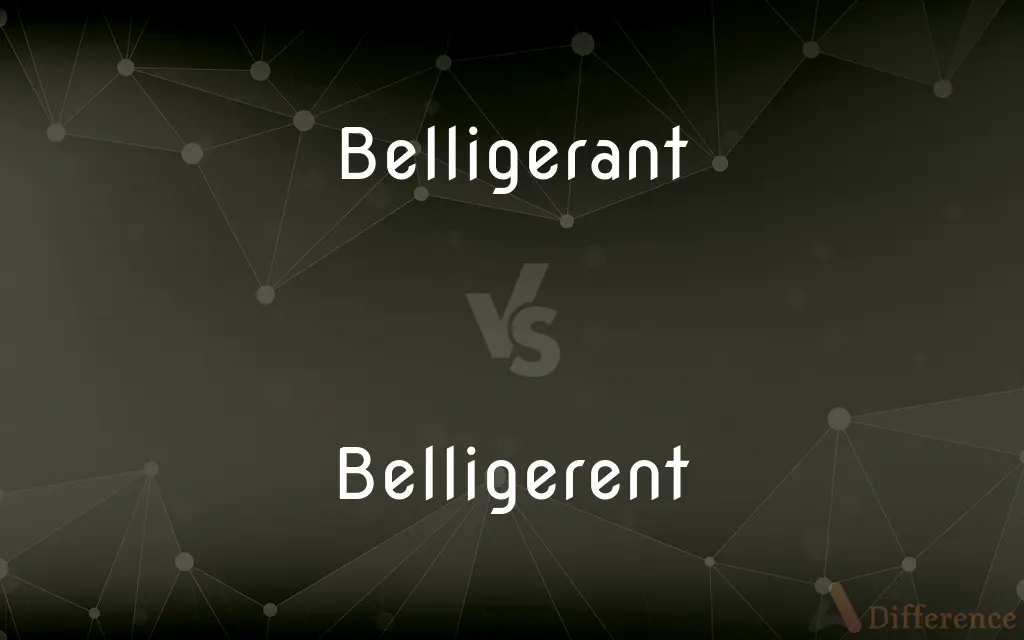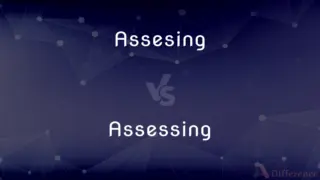Belligerant vs. Belligerent — Which is Correct Spelling?
By Tayyaba Rehman — Updated on April 1, 2024
"Belligerant" is an incorrect spelling. The correct spelling is "Belligerent," referring to a hostile or aggressive nature.

Table of Contents
Which is correct: Belligerant or Belligerent
How to spell Belligerent?

Belligerant
Incorrect Spelling

Belligerent
Correct Spelling
ADVERTISEMENT
Key Differences
Remember two "e"s and not "a" before the "nt."
Think of "belli" as in "bellicose" and "gerent" from Latin meaning to carry on.
The term "war" is "bellum" in Latin, which can be linked to "belligerent."
"Belligerent" ends like "intelligent" and "indulgent."
Recall "gent" as in "gentleman," even though "belligerent" is anything but gentle.
ADVERTISEMENT
How Do You Spell Belligerent Correctly?
Incorrect: Their belligerant stance in negotiations made it hard to reach an agreement.
Correct: Their belligerent stance in negotiations made it hard to reach an agreement.
Incorrect: She found it difficult to deal with her neighbor's belligerant attitude.
Correct: She found it difficult to deal with her neighbor's belligerent attitude.
Incorrect: The customer's belligerant complaints were difficult for the staff to handle.
Correct: The customer's belligerent complaints were difficult for the staff to handle.
Incorrect: He acted in a belligerant manner during the meeting, which was not appreciated.
Correct: He acted in a belligerent manner during the meeting, which was not appreciated.
Incorrect: The belligerant tone of his email caused quite a stir in the office.
Correct: The belligerent tone of his email caused quite a stir in the office.
Belligerent Definitions
Hostile and aggressive.
His belligerent attitude made discussions difficult.
A nation or person engaged in war or conflict.
The two belligerents signed a treaty.
Displaying assertiveness or aggression.
The team showed a belligerent spirit on the field.
Combative or ready to fight.
The belligerent man was asked to leave the bar.
A belligerent is an individual, group, country, or other entity that acts in a hostile manner, such as engaging in combat. The term comes from the Latin bellum gerere ("to wage war").
Inclined or eager to fight; hostile or aggressive.
Of, pertaining to, or engaged in warfare.
One that is hostile or aggressive, especially one that is engaged in war.
Engaged in warfare, warring.
Eager to go to war, warlike.
Of or pertaining to war.
(by extension) Aggressively hostile, eager to fight.
Acting violently towards others.
Uncooperative.
A state or other armed participant in warfare
The UN sent a treaty proposal to the belligerents.
Waging war; carrying on war.
Pertaining, or tending, to war; of or relating to belligerents; as, a belligerent tone; belligerent rights.
A nation or state recognized as carrying on war; a person engaged in warfare.
Someone who fights (or is fighting)
Characteristic of an enemy or one eager to fight;
Aggressive acts against another country
A belligerent tone
Engaged in war;
Belligerent (or warring) nations
A fighting war
Pertaining to war or those engaged in warfare.
Belligerent nations were in peace talks.
Belligerent Meaning in a Sentence
She received a warning for her belligerent conduct towards her colleagues.
The belligerent nation posed a threat to global peace.
Despite his belligerent reputation, he was a kind person at heart.
His belligerent behavior at parties often led to fights.
The belligerent tone of the debate made it uncomfortable to watch.
The belligerent driver honked incessantly at the traffic.
He wrote a belligerent letter to the editor, complaining about city policies.
Belligerent sports fans often cause trouble after games.
The company's belligerent stance against regulation worried investors.
Her belligerent response to criticism made it hard to give her feedback.
The belligerent protester was quickly escorted away by security.
Her belligerent opposition to the proposal surprised the committee.
Their belligerent refusal to compromise stalled the peace talks.
He was known for his belligerent attitude towards authority figures.
The belligerent teenager argued with everyone about anything.
Belligerent statements by the leader exacerbated the conflict.
The belligerent drunk was asked to leave the bar.
The belligerent crowd outside the courthouse shouted for justice.
The belligerent pirate ships approached, ready for battle.
Facing belligerent competition, the company decided to innovate.
Belligerent rhetoric often leads to increased tensions between countries.
His belligerent challenge to the speaker disrupted the conference.
The belligerent spirit of the warrior made him feared by his enemies.
A belligerent attitude in negotiations can lead to a deadlock.
Their belligerent posture during the dispute did not help resolve it.
Common Curiosities
What is the pronunciation of Belligerent?
Pronounced as "buh-LIJ-er-uhnt."
Which conjunction is used with Belligerent?
"And" as in "belligerent and aggressive."
What is the root word of Belligerent?
The root is from Latin "belliger" meaning "waging war."
What is the plural form of Belligerent?
The plural form is "belligerents."
Why is it called Belligerent?
It's derived from Latin "bellum" meaning "war" and "gerere" meaning "to carry on."
What is the verb form of Belligerent?
The related verb is "belliger."
Which vowel is used before Belligerent?
"A" as in "a belligerent."
Is Belligerent a noun or adjective?
"Belligerent" can be both an adjective and a noun.
Is Belligerent an adverb?
No, "belligerent" is not an adverb.
Is Belligerent a negative or positive word?
Generally considered negative due to its aggressive connotation.
Which article is used with Belligerent?
"The" or "a" depending on context.
What is another term for Belligerent?
"Aggressive" or "combative."
What is the opposite of Belligerent?
"Peaceful" or "amicable."
What is the singular form of Belligerent?
The singular form is "belligerent."
Which preposition is used with Belligerent?
"Toward" as in "belligerent toward."
Is Belligerent an abstract noun?
In its adjectival form, no. But in its noun form denoting a state of being, it can be considered abstract.
Is Belligerent a collective noun?
No, it is not a collective noun.
Is the word Belligerent imperative?
No, "belligerent" is not imperative.
How many syllables are in Belligerent?
There are four syllables in "belligerent."
What part of speech is Belligerent?
It's primarily an adjective but can also be a noun.
How do we divide Belligerent into syllables?
"Belligerent" divides as "be-lig-er-ent."
What is a stressed syllable in Belligerent?
The second syllable "lig" is stressed.
Which determiner is used with Belligerent?
Determiners like "this," "that," or "every" can be used.
What is the first form of Belligerent?
"Belligerent" as it's primarily an adjective.
What is the second form of Belligerent?
Not applicable; it's primarily an adjective.
What is the third form of Belligerent?
Not applicable; it's primarily an adjective.
Is Belligerent a vowel or consonant?
"Belligerent" is a word, not a letter, so it's neither.
Is the Belligerent term a metaphor?
It can be used metaphorically to describe aggressive behavior or stance.
How is Belligerent used in a sentence?
"The belligerent man was quickly escorted out of the party."
Is Belligerent a countable noun?
Yes, in its noun form, "belligerents" can be counted.
Share Your Discovery

Previous Comparison
Assesing vs. Assessing
Next Comparison
Tought vs. ThoughtAuthor Spotlight
Written by
Tayyaba RehmanTayyaba Rehman is a distinguished writer, currently serving as a primary contributor to askdifference.com. As a researcher in semantics and etymology, Tayyaba's passion for the complexity of languages and their distinctions has found a perfect home on the platform. Tayyaba delves into the intricacies of language, distinguishing between commonly confused words and phrases, thereby providing clarity for readers worldwide.














































